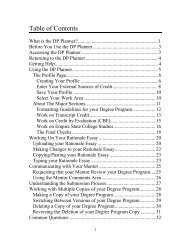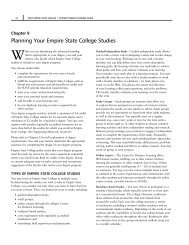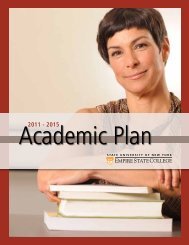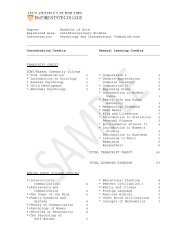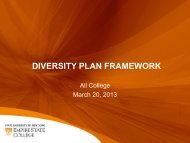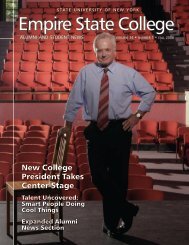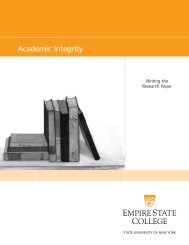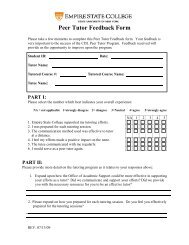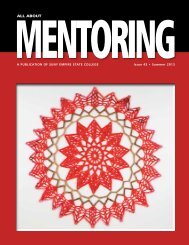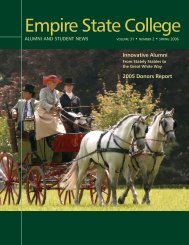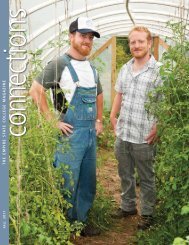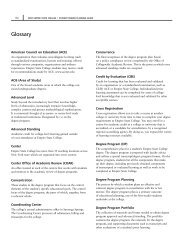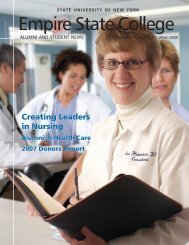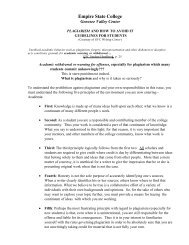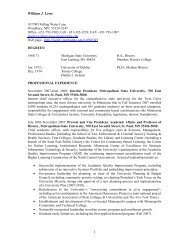All About Mentoring Spring 2011 - SUNY Empire State College
All About Mentoring Spring 2011 - SUNY Empire State College
All About Mentoring Spring 2011 - SUNY Empire State College
Create successful ePaper yourself
Turn your PDF publications into a flip-book with our unique Google optimized e-Paper software.
66<br />
Bob Lenard’s comprehension is tested<br />
and his interpretive abilities are exercised<br />
when after carrying out library research<br />
on the non-Western antecedents of Greek<br />
Classicism in Persia, Egypt, and India, he<br />
writes a paper discussing the non-Western<br />
and nonlinear influences underlying<br />
Western rationalism … The same is<br />
true for Charles Booth when he reads<br />
Marcuse’s One Dimensional Man and<br />
describes “transcendented being,” and<br />
of Janet Lessinger when she discusses the<br />
experiences of modern life as presented<br />
in Kafka’s The Trial and Laing’s The<br />
Divided Self.<br />
Analysis calls for the ability to break down<br />
a communication or an experience into basic<br />
elements, to identify the relative importance<br />
of ideas or incidents, and to make explicit<br />
the relationships among them.<br />
When Emma Schmidt creates her<br />
“intellectual autobiography,” looking<br />
back over her past reading and<br />
experiences, she tackles a complex<br />
analytic task … Dolores Guion faces<br />
a similar challenge when she examines<br />
the Health Science Programs at Hudson<br />
Valley Community <strong>College</strong> to determine<br />
what they include and whether there<br />
have been task analyses of the basic skills<br />
and concepts of health career workers …<br />
Donald Wentworth’s research project on<br />
The General Motors sit-down strike will<br />
call for similar analytic abilities.<br />
Evaluation calls for the ability to make<br />
qualitive and quantitative judgments in<br />
relation to given or understood criteria.<br />
It calls for judgments about the value of<br />
information, materials, and methods for<br />
specific purposes. In some cases, judgments<br />
may rest on internal evidence such as<br />
logical accuracy or internal consistency.<br />
In other cases, judgments may rest on<br />
external criteria which must be selected or<br />
formulated to fit the case, or which may<br />
depend upon using standard systems of<br />
appraisal.<br />
Dolores Guion’s study of Health Science<br />
Programs will have a substantial<br />
evaluative component as she makes<br />
judgments about the effectiveness of<br />
student training and the degree to which<br />
there is a good fit between the curricula<br />
and actual job requirements … Emma<br />
Schmidt’s study of the agency practices<br />
in relation to Spanish-speaking clients<br />
will evaluate their effectiveness and<br />
responsiveness to such persons and their<br />
effectiveness with them, and the degree<br />
to which requirements for employment<br />
and volunteer work permit persons of<br />
Spanish background to participate in the<br />
work of those agencies … Chuck Booth’s<br />
evaluative paper on experimental colleges<br />
will scrutinize and make judgments about<br />
their methods and curricula.<br />
Synthesis involves arranging and combining<br />
elements so that a structure or pattern<br />
emerges which was not clearly there before.<br />
The result may be a communication in<br />
which a writer or speaker conveys his ideas,<br />
feelings, or experiences to another; it may<br />
be a proposed plan or a set of abstract<br />
relationships which classify or explain<br />
certain phenomena and may be presented in<br />
verbal, mathematical, or artistic form.<br />
Dolores Guion’s report will synthesize<br />
the results of her analyses of the Hudson<br />
Valley Community <strong>College</strong> Health Science<br />
Programs … Emma Schmidt’s reports on<br />
community agencies which have Spanishspeaking<br />
clients and her interviews with<br />
faculty members in the Department<br />
of Human Services will call for the<br />
ability to draw together diverse kinds of<br />
information to make an integrated whole<br />
… Chuck Booth will need similar abilities<br />
when he compiles a bibliography for use<br />
in his course and organizes the readings<br />
in relation to students’ interests … In<br />
bi-weekly phone calls and conferences<br />
with the Mentor, Bob Lenard and others<br />
will create syntheses of their readings,<br />
travel, work experiences, volunteer<br />
activities.<br />
Application calls for the use of abstractions<br />
in particular and concrete situations, or<br />
for the ability to compare one set of ideas<br />
or experiences with another in order to<br />
consider the implications or potential<br />
consequences. The abstractions may be<br />
general ideas, rules, or procedures or they<br />
may be technical principles or theories.<br />
The capacity for application is critical if<br />
knowledge is to relate to the identification<br />
and solution of problems.<br />
<strong>Empire</strong> <strong>State</strong>’s program has special<br />
potency for this kind of intellectual<br />
competence. Donald Wentworth is asked<br />
how Marx and Engel’s definitions of<br />
the working class and the owner class<br />
apply to his own experiences in and out<br />
of the factory. He is asked to examine<br />
the relationship between the sit-down<br />
strikes and the preceding history of the<br />
labor movement, and the relationship<br />
between the CIO of the sit-downs and<br />
current union activities – especially of<br />
the U.A.W., his own union … Dolores<br />
Guion undertakes substantial background<br />
readings, studies a series of Health Science<br />
Programs, and develops her own optimal<br />
health education program for Licensed<br />
Practical Nurses … Chuck Booth relates<br />
Mersault’s “Passivity” to the “Aesthetic<br />
Concepts of Disinterestedness,” as<br />
discussed by Kant and Baumgarten; he<br />
considers Plato’s notion of dialogue as<br />
it applies to intercourse between student<br />
and teacher … Janet Lessinger reads<br />
Jews Without Money, Call It Sleep,<br />
The Autobiography of Malcolm X, The<br />
Second Sex, Last Exit to Brooklyn, The<br />
Man with the Golden Arm, Division<br />
Street America, and asks, “How do<br />
the lives of the persons in these books<br />
converge How does this convergence<br />
relate to life in a metropolis In what<br />
ways is the rhythm of urban life an assault<br />
against the persons on the underside and<br />
on their cultures”<br />
<strong>Empire</strong> <strong>State</strong>’s program aims to develop<br />
intellectual competence in these major<br />
areas. It asks students to acquire knowledge<br />
pertinent to their purposes, and to develop<br />
skills of comprehension, analysis, synthesis,<br />
application, and evaluation. Although the<br />
emphases differ, most contracts test a wide<br />
range of such abilities. In the course of his<br />
college career, each student will frequently<br />
be challenged to develop these skills.<br />
* * *<br />
However, intellectual competence is only one<br />
aspect of individual development. Significant<br />
educational experiences influence other<br />
major tasks which are the work of human<br />
development throughout life: increasing<br />
interpersonal competence, increasing<br />
awareness, clarifying purposes, becoming<br />
increasingly self-reliant, understanding<br />
oneself and others, and developing selfconsistency.<br />
Because these are important<br />
areas of concern for many students, and<br />
suny empire state college • all about mentoring • issue 39 • spring <strong>2011</strong>



